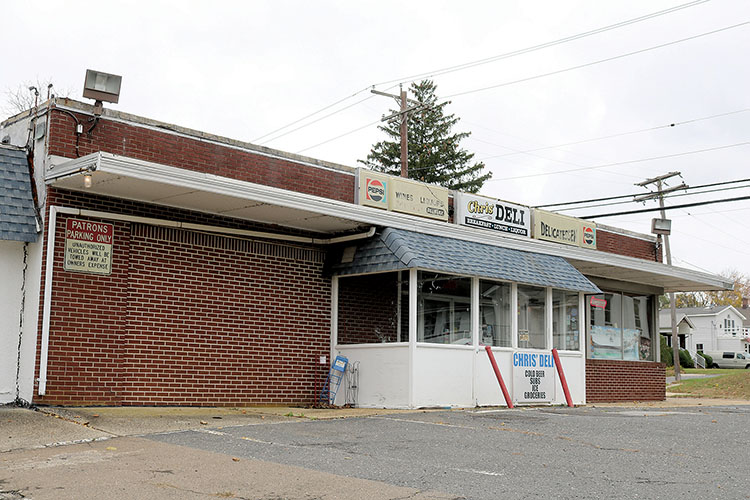By Jay Cook |
MIDDLETOWN – A pair of forgotten fuel storage tanks buried beneath West Front Street are triggering an environmental investigation as a former private marina is transformed into a county park.
Two weeks ago the Monmouth County Board of Chosen Freeholders authorized a $100,000 remedial investigation for two possible gasoline tanks associated with the shuttered Chris’ Deli in Middletown’s River Plaza section. It’s connected to Swimming River Park, acquired by the Monmouth County Park system in 2015.
“Years ago, you could drive up and stop to fill up for gas, the old-time gas stations,” said Monmouth Conservation Foundation executive director William Kastning, whose group aided in acquiring the park. “At some point in time, the road was widened and those tanks were not removed and covered over.”
Brinkerhoff Environmental Services, based in Manasquan, has been contracted for the investigation. The firm has been conducting environmental studies at Swimming River Park since the first 11-acre piece was brought into the county system.
Laura Brinkerhoff, a Licensed Site Remediation Professional and principal at Brinkerhoff, said details are still unknown about any pollution from gasoline into the soil in the immediate area.
“We don’t know that there’s even product in the tanks,” Brinkerhoff said. “The whole purpose of this exercise is to confirm the nature of the problem and if we can remedy it while we’re out there doing the work.”
Kastning said soil samples taken downhill showed no signs of pollution.
Depending on permits with Middletown, Brinkerhoff said she anticipated breaking ground on West Front Street by the end of November, and no later than December. Road closures on West Front Street are anticipated.

Kastning called this effort “a very complex deal.” The tanks were forgotten in years past and then paved over as West Front Street expanded, meaning the road must be ripped up. Additionally, he said, New Jersey Natural Gas had placed gas lines between the tanks and the road surface.
“We are coordinating this work with all of the utility providers with utilities in the road for safety reasons,” Brinkerhoff said. “Anytime you’re working in a roadway where there’s public utilities, it’s an area you have to exercise extreme caution.”
Brinkerhoff said, generally, tanks would not be removed but instead cut open, emptied of any contents if present, have samples taken and then be filled with cement or another inert substance.
It’s common in New Jersey to find fuel storage tanks left underground, Brinkerhoff said. Regulations were lacking until the 1980s when the New Jersey Department of Environment Protection began cracking down on removals, she noted.
“The owner or operator of an establishment could simply dig a hole and put a new tank in the ground,” she added. “They were more concerned about going forward with what could be done rather than looking back and cleaning up what had been done in the past.”
Environmental studies and remediations are not new to Swimming River Park. A preliminary study by Brinkerhoff Environmental Services found traces of dredge materials, historic fill and asphalt millings collected over time at the new county park.
Kastning said the plan is to cap between eight to nine acres of land at the park with new soil as a precautionary measure. He added it would prohibit rainfall from seeping through the surface into the groundwater, thus finding its way into the confluence of the Swimming and Navesink rivers.
While Monmouth County officials had authorized purchasing the deli property in 2016, it has not gone through yet because of the impending study. Kastning anticipated closing on the former deli property by the end of the year.
NJ DEP spokesman Rob Geist said Monmouth County will be reimbursed for the $100,000 cost through the state Hazardous Discharge Site Remediation Fund. If remediation action is required, the state would cover 75 percent of all costs.
Monmouth Conservation Foundation and the Monmouth County Park System partnered to purchase Swimming River Park in 2015 for $3.8 million. The property was formerly Chris’ River Plaza Marina which had operated for about 50 years and was one of the many private marinas with access to the Navesink.
Updated design plans provided by MCF show a riverine boardwalk with seating, two fishing and crabbing docks, a two-lane boat ramp with service docks and parking for 15 boat trailers near the watershed. A quarter-mile, multiuse paved loop closer to the West Front Street Bridge and a memorial for MCF co-founder Judith Stanley Coleman are also planned for the park.
“It’s a much better use of the property than building condominiums or apartments,” Brinkerhoff said. “It’s a beautiful vista and will be an awesome urban park.”
This article was first published in the Nov. 9-16, 2017 print edition of The Two River Times.














